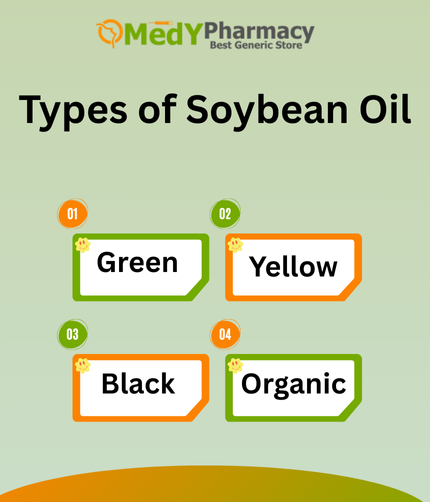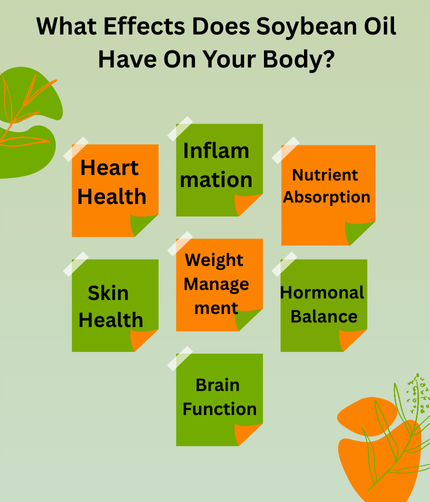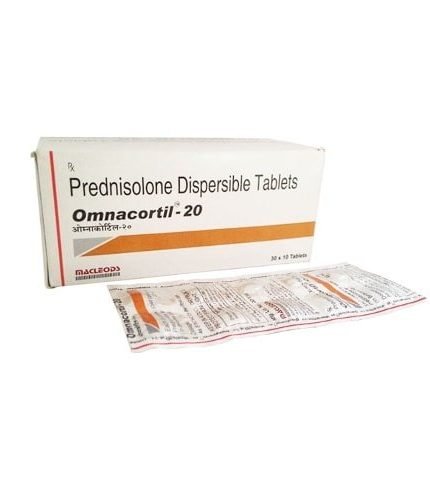Introduction:
Soybeans are a powerful source of plant-based protein and also contain other healthy plant substances. Although they may lessen menopausal symptoms and lower your risk of cancer, consuming too much of them might lead to stomach issues.
Having been eaten for thousands of years, they form a significant part of Asian cuisine.
These are frequently consumed whole in Asia, while highly processed soy products are far more prevalent in Western nations.
Soy flour, soy protein, tofu, soy milk, soy sauce, and soybean oil are among the many types of soy goods that are accessible.
Antioxidants and phytonutrients found in this are associated with several health advantages. But worries have been expressed regarding possible negative consequences.
Packed with linoleic acid and other vital fatty acids, this helps keep your skin moisturised and supple by preserving the skin’s natural barrier.
The abundance of vital vitamins, such as vitamin E, a potent antioxidant that protects the skin from damage caused by free radicals and makes it seem younger.
Rich in powerful phytosterols, this is perfect for people with sensitive or irritated skin since it helps soothe and relax it.
Because they are high in protein and healthy, they have many nutritional applications. People can consume them as supplements, eat them, or drink them in place of milk.
The advantages and disadvantages of eating soy are debatable, though, because some farmers have genetically modified the plant.
What Is Soybean Oil?
The soybean plant’s seeds are used to make this particular kind of vegetable oil.
With poly- and monounsaturated fatty acids accounting for over 81% of its fat composition, this is mostly composed of unsaturated fat. This is also used by many on the ketogenic diet to increase their consumption of fat because it has around 14 grammes of fat per tablespoon.
Although this can be incorporated into a balanced diet in moderation, hydrogenated oils should be avoided at all costs. These are fats that have been hydrogenated, a technique that helps producers save money and increase shelf life.
Nevertheless, it also leads to the production of trans fatty acids, which are dangerous lipids linked to an increased risk of diabetes, cancer, heart disease, and other conditions.
A source of necessary fatty acids that the body cannot make on its own, it is heavy in polyunsaturated fats, especially omega-6 fatty acids, and also includes lower levels of omega-3 fatty acids. Additionally, it is a natural source of vitamin E, an antioxidant that aids in cell defence.
In addition to culinary consumption, this is involved in industrial items such as paints, soaps, and biodiesel. To enhance shelf life, the processed food sector frequently partly hydrogenates it, but this can produce trans fats, which are substances associated with health hazards. As a result, many goods are now subject to stricter regulations and have been reformulated.
A Completely Nutritious Food Product
The sweet and delectable flavour of soybean oils shouldn’t overwhelm you. A nutritional study on the subject shows that it has a high-calorie content, giving you a quick increase in energy.
- Frying
- Baking
- Roasting
In addition, it has vitamins, minerals, fibres, manganese, vitamin B, copper, thiamine, folates, potassium, magnesium, riboflavin, and iron. With such a favourable nutritional composition, Duralast 30 is also beneficial to men’s health.
This item of tropical oil also contains critical amounts of calcium, zinc, and phosphorus. Antioxidants that guard against the damaging effects of free radicals are also present in it.
Although there isn’t a single natural meal that satisfies all of these criteria, there are several that get close. But diversity is still important for long-term health—the best sustainable and natural method to guarantee full nutrition is to consume a variety of foods.
Nutrition Facts of Soybean Oil
- Calories: 172
- Water: 63%
- Protein: 18.2 grams
- Carbs: 8.4 grams
- Sugar: 3 grams
- Fiber: 6 grams
- Fat: 9 grams
- Saturated: 1.3 grams
- Monounsaturated: 1.98 grams
- Polyunsaturated: 5.06 grams
- Carbohydrates: 0 grams
A substantial source of energy in the diet, this plant-based oil is high in calories and mostly made up of good fats. About 120 calories, entirely from fat, are included in one tablespoon.
Its notable absence of protein, fibre, carbs, and cholesterol highlights its function as a pure fat source. It is also a natural source of essential fat-soluble vitamins, including vitamin K, which promotes bone health and blood coagulation, and vitamin E, an antioxidant that helps shield bodily structures from harm.
- Protein
These rank among the top plant-based protein sources. Between 36 and 56 percent of the dry weight is protein.
The protein content of one cup of boiling soybeans is around 31 grammes. Despite not being as high-quality as certain animal proteins, soy protein has a very strong nutritional value.
Some individuals may experience allergic responses as a result of these proteins.
This consumption has been associated with a slight reduction in cholesterol levels.
- Fat
To manufacture soybean oil, they are categorised as oilseeds.
About 18% of the dry weight is made up of fat, mostly monounsaturated and polyunsaturated fatty acids; however, there is also some saturated fat.
With around half of the total fat content, linoleic acid is the most common form of fat.
- Carbs
The glycemic index (GI), which gauges how meals impact the rise in blood sugar following a meal, is extremely low for whole soybeans due to their low carbohydrate content. These are good for diabetics because of their low GI.
- Fiber
There is a good quantity of both soluble and insoluble fibre in this.
Alpha-galactosides, the predominant insoluble fibres, can induce diarrhoea and flatulence in susceptible people.
FODMAPs are a family of fibres that includes alpha-galactosides, which may make irritable bowel syndrome symptoms worse.
Although some people experience undesirable side effects, soluble fibres found in soybeans are typically regarded as beneficial.
Short-chain fatty acids (SCFAs) are produced when bacteria in your colon ferment them, perhaps enhancing gut health and lowering your risk of colon cancer.
Types of Soybean Oil
There are several methods for people to cook and consume soy, and it may be used in place of various meat and dairy products.

- Green Soybeans
Edamame, another name for green soybeans, are fragile, immature soybeans that are picked before they reach full maturity. In contrast to the more mature, beige-coloured soybeans used for oil or tofu, edamame is bright green and has a somewhat sweet, nutty flavour.
Usually served boiled or steamed, they are frequently seasoned with salt and can be eaten raw or shelled and then used in stir-fries, salads, and rice dishes.
The nutritional value of edamame is enormous. Vegetarians and vegans particularly like it since it’s a great source of high-quality plant protein. It also offers vital minerals like calcium, magnesium, and iron, as well as vitamins like folate, vitamin K, and dietary fibre.
Edamame also includes flavones, which are natural plant components that may help maintain hormone balance, bone strength, and heart health.
- Yellow Soybeans
Because of their adaptability and beautiful golden hue, yellow soybeans are the most popular and extensively grown type of soybeans. Before being used, yellow soybeans are dried and fully developed, in contrast to green soybeans, which are collected when still fresh and fragile.
Both whole-food diets and the processed food industry rely heavily on yellow soybeans due to their neutral flavour and high protein content.
In terms of nutrition, they are a complete protein, as they include each of the nine necessary amino acids that the body requires. Additionally, flavones—plant-based chemicals with antioxidant qualities—found in yellow soybeans may assist hormone balance, bone strength, and heart health.
- Black Soybeans
With their creamy, light insides and jet-black outer skins, black soybeans are a unique and nutrient-dense kind of soybean. Despite being less popular than yellow soybeans, they are an essential part of East Asian traditional medicine and food, particularly in China, Korea, and Japan, where they are prized for their flavour and texture as well as their potential to improve health.
Both dried and canned, black soybeans are frequently used in rice dishes, soups, stews, and even desserts.
Whether added to a substantial soup, mixed into a salad, or fermented into a product like miso or black soybean natto, black soybeans are a tasty, nutrient-dense supplement to any diet that offers remarkable health advantages.
- Organic Soybean
Natural farming methods that put biodiversity, soil health, and sustainable agriculture first are used to grow them.
Tofu, soy milk, edamame, and soy protein isolates are just a few of the items that frequently include them. Customers who prefer food cultivated without artificial chemicals and who want to support sustainable agricultural methods can feel more at ease when they choose organic soybeans.
The beans are free of hazardous residues thanks to organic agricultural methods, which place an emphasis on crop rotation, composting, and non-toxic insect control.
An Aid for Food Digestion
This is an oil product that might aid with digestion. Therefore, it is a good idea to use some of this when cooking if you have frequent digestive problems like gas, bloating, or indigestion.
Studies indicate that this is because the oil contains certain antioxidants that may increase the flow of blood through the stomach and enhance vital digestion and nutrient absorption.
According to a different study, it could also aid in avoiding inflammatory conditions and other types of intestinal and stomach infections.
How Soybean Oil Works?
Because it can tolerate high cooking temperatures and has a neutral flavour that doesn’t dominate food, this oil is best used for cooking and food processing. This is a product of processing soybean seeds using techniques like solvent extraction and cold pressing. After the natural fats in the soybeans are extracted, a highly refined oil with a moderate flavour and a clear, light hue is produced.
This contains a variety of polyunsaturated fats, including omega-6 fatty acids, which, when taken in moderation, are good for the heart. Additionally, it has trace levels of saturated fat and monounsaturated fats.
The ratio of these fatty acids makes it a great option for a variety of cooking uses, particularly because omega-6 fatty acids are necessary for body processes, but must be.
Its capacity to aid in the emulsification of components and enhance the texture and shelf life of several processed meals makes it useful in food processing as well. For example, soybean oil contributes a smooth and uniform texture and aids in binding components in baked products, mayonnaise, and salad dressings.
Numerous physiological processes, such as inflammation reduction and brain health, are supported by these omega-3 fatty acids. However, balance and moderation are key to the health advantages of soybean oil.
Uses of Soybean Oil
Additionally, this produces biodiesel, soy oil, and other industrial supplies that individuals may use for cooking. The leftover material from soybeans may be used to manufacture soy products like tofu and soy milk, as well as pet and farm animal feed.
Soy is used by certain producers to generate protein powder and isoflavone supplements.
- Cooked Soybeans
- Edamame
- Soy Milk
- Tofu
- Tempeh
- Soy Nuts
What Effects Does Soybean Oil Have On Your Body?

- Heart Health
This has a lot of polyunsaturated fats, especially omega-6 fatty acids, which can help decrease bad cholesterol (LDL) and strengthen the heart.
This vitamin E serves as an antioxidant, preventing free radicals from damaging blood vessels and promoting cardiovascular health in general.
Additionally, the anti-inflammatory qualities of these polyunsaturated fats aid in lowering blood vessels and other bodily inflammation. Long-term cardiovascular health depends on lowering chronic inflammation since it is associated with a higher risk of heart disease.
For best heart health, it is necessary to combine this with other omega-3 sources and have a well-balanced, nutrient-dense diet.
- Inflammation
It is a vital component of the immune system and aids in defending the body from harm and illness.
Although it is high in beneficial polyunsaturated fats, it mostly consists of omega-6 fatty acids. High consumption combined with insufficient omega-3 fatty acids might lead to an imbalance that may encourage the body’s chronic inflammation.
The good news is that soybean oil does have some omega-3s, but not as much as omega-6. The inflammatory effects of these are lessened, and a healthy inflammatory response may result when they are incorporated into a balanced diet that also contains adequate omega-3s from other sources.
This equilibrium lowers the danger of chronic inflammation and the illnesses linked to it by ensuring the body can sustain an ideal inflammatory response.
- Nutrient Absorption
The body absorbs and uses the nutrients from the food we consume through a process called nutrient absorption. Numerous physiological processes, including the immune system and bone and skin health, depend on these vitamins.
Furthermore, compared to certain other oils that are heavier in saturated fats, such as coconut or palm oil, this offers a more balanced fat profile. Soybean oil’s polyunsaturated fats support effective nutrition absorption and heart health, making it a nutritious option for food preparation and cooking.
Supplying the dietary fat required to properly digest fat-soluble vitamins aids in maximising their absorption. You may improve your body’s capacity to absorb and use these vital nutrients, which promote general health and well-being, by including them in a balanced diet.
- Skin Health
Numerous factors, such as exposure to the environment, hydration, and diet, affect skin health. Omega-3 fatty acids and vitamin E are abundant in soybean oil, which has several advantages for keeping skin looking young and healthy.
Moreover, because of its high-fat content, this works well as a moisturiser. In order to keep the skin moisturised and avoid dryness, it helps seal in moisture when applied topically. Because it softens and smoothes the skin’s surface, its emollient qualities make it a helpful component for those with dry or rough skin. In order to avoid dry skin and give long-lasting hydration, this is frequently included in body lotions, creams, and balms.
Adding soybean oil to one’s skincare regimen may assist people with inflammatory skin disorders in controlling their symptoms and enhancing the texture of their skin.
- Weight Management
Using soybean oil to control weight requires moderation. Consuming healthy fats, such as those found in soybean oil, in moderation can help people lose weight without consuming too many calories.
This means that, when consumed in moderation as part of a balanced diet, soybean oil is a better choice for promoting metabolism than oils that are heavy in saturated fats.
Furthermore, fats—including those found in soybean oil—can produce a sensation of fullness, which can help suppress appetite and avoid overindulging. This can be especially helpful for people who are attempting to maintain their weight because eating healthy fats in moderation can help regulate hunger and promote portion management.
- Hormonal Balance
A balanced hormone system is necessary to keep the body and mind healthy. From metabolism to mood, immune system function, development, and reproductive health, hormones control almost every bodily function.
Polyunsaturated fatty acids, especially omega-6 fatty acids, which are vital for the synthesis of several hormones, are abundant in this food. The body uses omega-6 fats to help make several hormones that control vital functions, including cell development, inflammation, and immunological response.
Prolonged inflammation can interfere with the endocrine system, influencing the function and synthesis of hormones. Omega-3 fatty acids have the potential to provide a more nutritious hormonal environment by lowering inflammation.
- Brain Function
Nutrition, lifestyle, environment, and heredity are some of the elements that affect brain function.
The efficient functioning of the brain depends on neurotransmission, which contributes to and is vital to the construction of neurone membranes.
Long-term brain health is ensured by omega-3 fatty acids’ anti-inflammatory properties, which also lower the risk of neurodegeneration and encourage the development and repair of brain cells.
According to certain research, omega-3 fatty acids may help people with bipolar illness and other mood disorders.
Additionally, as we age, they support the maintenance of brain structure and function, guaranteeing ongoing cognitive flexibility and adaptation.
Increases Immunity
Elderly adults with a variety of allergies and illnesses are frequently observed. It is primarily brought on by age, which causes your blood’s immune cell count to decline.
Your immunity, however, could be strengthened by this. Essential vitamins like C, D, and K, as well as important minerals like antioxidants, magnesium, potassium, and copper, are the cause.
Individuals who consistently use soy oil may be less susceptible to many bacterial and viral diseases.
Additionally, utilising soy oil in meal preparation for children is advised to boost immunity from an early age.
Perils and Adverse Reactions
Despite the fact that this ubiquitous cooking oil has many advantages, there are also certain risks and side effects to be aware of.
To begin with, a large number of vegetable oils available on the market are highly refined and processed, including other seed oils like grapeseed and canola oil. It is preferable to choose less processed, unprocessed foods to optimise the possible health advantages.
Furthermore, most soybeans grown in the US are genetically engineered grains. A lot of individuals decide to stay away from genetically modified organisms because they are worried about the long-term health consequences, as well as problems like increased allergenicity and antibiotic resistance.
You may lessen your exposure to genetically modified organisms by choosing this product made from organic, non-GMO soybeans.
Like many other vegetable oils, this has a significant content of omega-6 fatty acids. Over time, a high omega-6 fatty acid intake may exacerbate inflammation and chronic illness.
Lastly, remember that a healthy diet should also completely exclude hydrogenated soybean oil. These fats include trans fats, which have been connected to an increased risk of heart disease, diabetes, cancer, and other chronic illnesses. Fast food, baked goods, cookies, chips, and crackers are examples of processed foods that frequently include hydrogenated fats.
Could Aid in the Cure of Cancer
Few of you may be aware that this vegetable is excellent for preventing or even treating cancer. This is because the vegetable contains antioxidants, which guard against oxidative stress and extreme tissue inflammation.
According to certain research, the oil’s anti-inflammatory qualities may be attributed to the antioxidants and anti-inflammatory compounds it contains.
According to studies, cooking your regular meals with soy oil may help avoid serious malignancies, including stomach, breast, and pancreatic cancers. Additionally, it is beneficial for men who use super p force extra.
Might Aid In the Treatment of Arthritis Symptoms
A very serious ailment that affects the joints and causes internal inflammation in many people is arthritis.
The anti-inflammatory compounds that are present in the oil are what may help with pain. According to additional research, the antioxidants in this can also treat inflammatory conditions.
General studies suggest that those who frequently take this may shield themselves against severe osteoarthritis, despite the lack of a definitive study report on the topic. Additionally, it could aid in the treatment of osteoporosis and other bone problems.
Promotes Quick Pain Recovery
Are you experiencing frequent muscular cramps or injuries as a result of your body being overworked? According to studies, this oil could be the ideal remedy for these problems. It may readily treat muscle strains and cramps since it contains antioxidants, a variety of vitamins, and vital minerals like potassium and phosphorus.
According to studies, incorporating dishes prepared with this oil into your diet on a daily basis can help avoid these problems.
In one trial, even individuals who experienced muscular cramps were given modest doses of soy oil extracts on a daily basis, and the problem was resolved in a matter of days.
What Effect Does Soybean Oil Have On Estrogen?
One kind of plant estrogen found in soy is called isoflavones. There is, however, insufficient data to support a connection between soy intake and bodily hormonal alterations.
The presence of phytoooestrogens, which are plant-based substances that mimic estrogen in the body, may have a slight impact on estrogen levels. However, the effect is usually mild and is dependent on the whole diet, individual hormone sensitivity, and the amount ingested.
There have been worries expressed over soy products’ potential to increase estrogen or decrease testosterone in males. However, current research indicates that modest soybean oil consumption does not appear to significantly alter testosterone levels.
Foods and oils made from soy may have a minor estrogenic impact, according to some research, which may aid with menopausal symptoms, including mood swings, hot flashes, and bone loss. Usually, though, the impact is mild and not comparable to hormone treatment.
Are Soybean Oil or Nuts?
In particular, soybeans are classified as legumes, which also include pulses and beans. The legume family also includes peanuts, chickpeas, lentils, kidney beans, and black beans.
Both are derived from plants, but their nutritional content, health advantages, and modes of usage are very different. The distinctions between them, their advantages, and how to choose the best option based on your dietary requirements are broken down here.
Nuts that are entire foods, such as cashews, walnuts, almonds, and pistachios, offer a variety of vitamins and minerals, fibre, plant-based protein, and healthy fats. In addition to having a high omega-3 content, they are naturally abundant in antioxidants.
As long as it’s little processed and included in an omega-3-rich diet, soybean oil can be a helpful plant-based cooking oil when used sparingly.
Nuts are a great option if you’re seeking general nourishment because they include protein, fibre, healthy fats, and a variety of other vital components.
When combined, they can enhance a nutritious diet and utilise nuts for snacks or as a supplement to meals and oils for cooking.
The health and attractiveness of your skin may be improved naturally with this potent and multipurpose emollient.
But a lot of vegetable oils are highly processed, contain a lot of omega-6 fatty acids, and might come from the Medypharmacy facilities.
























